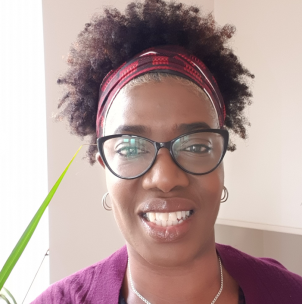Welcome to
Remi Roach Counselling
Your mental health, matters
Online and in-person therapeutic counselling available for individuals in Bromley, Bexley, and across London and the UK
Welcome, and thank you for visiting Remi Roach Counselling.
My name is Patricia "Remi" Roach, and I am a therapeutic counsellor providing short, and long-term therapy to individuals across the UK. I work both online and in-person, and can accommodate in-person locally in the Sidcup, Bexley, Bromley, and Orpington areas.
As an integrative therapeutic counsellor, I am trained to use a combination of psychological theories to suit the unique needs of my clients. I provide a calm, relaxed, respectful, non-judgemental space where clients can feel fully seen, heard, supported, and understood. Find out more about how counselling can help here.

One of the main bodies overseeing the accreditation and registration of counsellors in the United Kingdom is the British Association for Counselling and Psychotherapy (BACP). I am a BACP Registered Counsellor, which means I have met their criteria for qualified and experienced therapists and work in accordance with their ethical framework.
Speak in Confidence
The therapeutic space is a safe place where your thoughts and feelings can be expressed freely, honestly, in confidence, and without judgement. I will listen with sensitivity, compassion, empathy, and understanding.
A problem shared...
Many people face difficulties in their everyday lives that can be hard to get on top of. Whether the issue is anxiety, or panic attacks; low mood or self-esteem, depression; relationship issues; bereavement, or suicidal thoughts, counselling provides an approach and equips you with a set of tools to help gain a better understanding of what’s causing these problems - and how you can move towards feeling in control of your life again.
Realign your thoughts to achieve a better life
As we continue to work together, I can help you gain greater insight into the difficulties you are facing, help you understand why you act or react the way you do, and see how you can begin to realign your thoughts, feelings and behaviour moving forward.
How can counselling help you?
Therapy can help uncover the unhelpful negative thought patterns that have stifled the client's ability to enjoy life. I have a person-centred, relational approach to counselling, which means I put the client's needs and well-being at the forefront of our sessions. The development of a good rapport between us is key to meeting your goals for therapy. I am empathic, understanding and genuine. I draw on a lifetime of experiences working with and supporting diverse individuals and my therapeutic knowledge and skills, to help my clients reach their therapeutic goals.
People come to me for help a wide range of issues. Here are a few of the more common difficulties that can be supported through counselling:
Feelings of stress or anxiety
Panic attacks
Relationship problems
Grief, loss or bereavement
Problems with addiction
Trauma and post-traumatic stress
Survivors of Abuse
Depression
Problems with confidence or self-esteem
Anger management
Issues relating to sexuality
Difficulties at work or in retirement
Problems with family or school life
Suicidal thoughts
About Me
After a long career in various roles in public transport in London, where I supported people performance, diversity, equality and inclusion across individuals from all walks of life, I decided to retrain as a therapeutic counsellor to continue to support individuals in reaching their goals and achieving their full potential.
I have worked with clients in the NHS, Cruse Bereavement Support, and have experience of working with issues impacting individuals who are over 50 years old, and Children and Young People impacted by bereavement, relationships at school and home, gender identity, domestic violence, eating disorders, addiction, and self-harm. I have particular interests in intergenerational trauma and intercultural therapy.
I am qualified to work with common mental health issues that may present themselves as a result of bereavement, loss, job, relationship or family related issues. My qualifications include:
- CPCAB Diploma in Therapeutic Counselling
- Certificate in Understanding Children and Young People’s Mental Health
- Mental Health First Aider : Mental Health England
- Certificate in Equality & Diversity
My location
I work online across the UK, but can accommodate in-person counselling locally in the Bromley, Sidcup, Bexley and Orpington areas.
Sessions are 50 minutes long, usually held on a weekly basis using Google Meet or Zoom, if online, and rooms in Sidcup for in-person sessions.
Please get in touch to book an appointment.
Fees
Employed person
£60 per session
Students
£40 per session
Low income
£35-£45 per session
Note that if you want to cancel an appointment I require 48 hours’ notice; otherwise you will still need to pay for any sessions missed.
Get in touch
Feel free to contact me if you have any questions about how counselling works, or to arrange an initial assessment appointment. This enables us to discuss the reasons you are thinking of coming to counselling, whether it could be helpful for you and whether I am the right therapist to help.
You can also call me on 07704292514 if you would prefer to leave a message or speak to me first. I am happy to discuss any queries or questions you may have prior to arranging an initial appointment.
All enquires are usually answered within 24 hours, and all contact is strictly confidential and uses secure phone and email services.
Some frequently asked questions
Counselling is usually a good way to help with a common everyday problem; something that can be discussed, and a better place reached within a limited number of sessions. Over 6 - 10 weeks the understanding of the problem improves, and a way forward becomes clear. Longer term therapy describes sessions that go a bit deeper, towards more substantial life issues and problems perhaps originating from the client’s childhood. Therapy often requires a long-term approach, so the number of sessions can be open-ended. Which option is most suitable depends on the client and the difficulties they are facing.
Everything that is said within the counselling room is confidential - this is one of the main ways counselling and therapy differ from talking to a friend or relative. The ability to speak in confidence is proven to help a client talk about their deeper concerns.
Note, that there are some situations where there may be an immediate risk to yourself or others, and the law requires that I notify an authority; in these cases, I may not be able to keep total confidentiality. Breaking confidentiality is very rare though, and usually the client has been informed. However, it may not always be possible to inform the client beforehand if there is reasonable cause to believe this would put the client or someone else in danger.
It is not unusual for a client to be nervous about entering into counselling and want a familiar person as support when coming to see a therapist. This anxiety is understandable, but a key aspect of therapy is that you should feel free to talk about any issues you feel are important to you. Having someone else with you makes opening-up more difficult, and for this reason I do not see clients accompanied by friends or family. Where required, a translator is permitted to attend sessions.
How long a period of counselling lasts will vary from person to person and depend on the depth of the issues they are facing. For some people, having 4-6 sessions helps to bring their problems into focus, and they feel ready to move forward; other problems may require more of an open-ended approach.
Before we begin any work, we will agree on the number of sessions we’ll undertake, and at the mid-point and end of that number, we will review our progress. If we both agree further therapy will be of benefit to you, sessions can continue.
I offer a free initial 15-minute phone or video call to give you the opportunity to ask questions and provide some information on what you are looking for from the sessions, and to explore whether we are the right fit for each other. This can be arranged within a few days depending on availability. I aim to offer a first appointment - known as an initial assessment - within 1-2 weeks. Following the initial assessment, we would agree a set number of counselling sessions that take place at the same time each week.
© Remi Roach Counselling
powered by WebHealer



